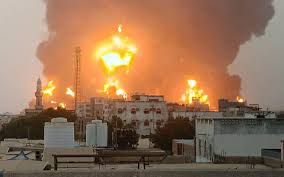After Gaza, Israel now attacks Yemen: Airstrikes on Houthi bases, Defense Minister said – this is the price of Israeli blood

9 months after the war against Hamas, Israel on Saturday carried out airstrikes on several Houthi rebel bases in Yemen for the first time. News agency AFP reported that Israel targeted Hodeida port and power station occupied by Houthi rebels.
Yemen’s news channel Almasira TV reported that a massive fire broke out in a fuel depot after the attack. Many photos and videos have surfaced on social media, in which smoke is seen rising. 3 Houthi rebels have died in this attack, while 87 people have been injured. However, given the severity of the attack, this figure is expected to increase.
Israelis have attacked Yemen in response to the attack on Tel Aviv. In fact, Houthi rebels carried out a drone attack on the Israeli city of Tel Aviv on Friday (July 19). A 50-year-old Israeli was killed in this. At the same time, about 10 people were injured.
Israeli Defense Minister Yoav Galant said after the attack on Yemen, “The blood of Israeli civilians has a price and if the Israelis are attacked, the result will be the same as in Lebanon and Gaza.” Galant said, “The fire that is burning in Hodeida at this time is being seen throughout the Middle East and its meaning is clear.”
Houthi army spokesman vows to respond to the attack
Houthi spokesman Mohammad Abdulsalam said that Israel has also targeted its civilian targets. He said that the purpose of the brutal Israeli attack was to increase the pain of the people of Yemen and to put pressure on them to stop their support to Gaza.
Houthi army spokesman Yehya Sari has vowed to respond to the attack. He said that the Houthis will not hesitate to attack Israel. Sari said that Tel Aviv is still not safe. We have prepared for a long war with the enemy.
Israel said – this is a response to the drone attack on Tel Aviv
Israel said that its fighter jets have attacked the military bases of Houthi rebels. Israeli spokesman Daniel Hagar said that these attacks are a retaliation for the drone attack on Tel Aviv on Friday (July 19) and about 200 missiles fired by Yemen in Israel since October last year.
Israeli officials said that this is the first attack on Yemen from their side. Israeli officials said that they targeted Hodeida because it is the main route for Iranian weapons to reach Yemen. An Israeli army spokesman said that their target was infrastructure that was being used for terrorist activity.
Yemen has been attacking Israel since the war with Hamas
Yemeni rebels have continuously attacked Israel since the start of Israel’s war with Hamas in Gaza on October 7 last year. Yemen has targeted Israel several times with drones and missiles. Most of these attacks have been stopped by the Israeli army or its allies.
However, Israel could not stop the drone attack in Tel Aviv on Friday (July 19). The Houthis said that they had attacked with a new drone, which can penetrate the enemy’s system.
The Houthis have also attacked US bases and commercial ships in the Red Sea. Their aim is to stop ships reaching Israel. The Houthis say that they carry out these attacks as their support to the Palestinians. Both Britain and the US responded to the attacks on the ships by attacking Houthi bases in Yemen. However, Israel never participated in these attacks.
Who are the Houthi rebels?
- The Houthis are an armed group of Yemen’s minority Shia ‘Zaidi’ community. This community formed this group in the 1990s to fight the alleged corruption of then President Ali Abdullah Saleh. They are named after the founder of their movement, Hussein al-Houthi. They also call themselves ‘Ansar Allah’, i.e. companions of God.
- During the US-led attack on Iraq in 2003, the Houthi rebels gave the slogan, “God is great. Down with America, down with Israel. Destruction of the Jews and victory of Islam.” They described themselves as part of the Iran-led ‘axis of resistance’ against Israel, the US and the West, along with Hamas and Hezbollah.
- Civil war broke out in Yemen in 2014. Its root is the Shia-Sunni dispute. According to a report by the Carnegie Middle East Center, there was always a dispute between the two communities, which turned into a civil war with the beginning of the Arab revolution in 2011. In 2014, Shia rebels opened a front against the Sunni government.
- This government was led by President Abdrabbuh Mansoor Hadi. Hadi had snatched power from former President Ali Abdullah Saleh, who had been in power for a long time, in February 2012 after the Arab Revolution. Hadi was struggling to bring stability in the country amid the changes. At the same time, the army was divided into two and the separatist Houthis mobilized in the south.
- In the race to dominate the Arab countries, Iran and Saudi Arabia also jumped into this civil war. On one hand, the Houthi rebels got the support of the Shia-dominated country Iran. On the other hand, the government got the support of the Sunni-dominated country Saudi Arabia.
- In no time, the rebels known as Houthis captured a large part of the country. In 2015, the situation had become such that the rebels forced the entire government to go into exile.







